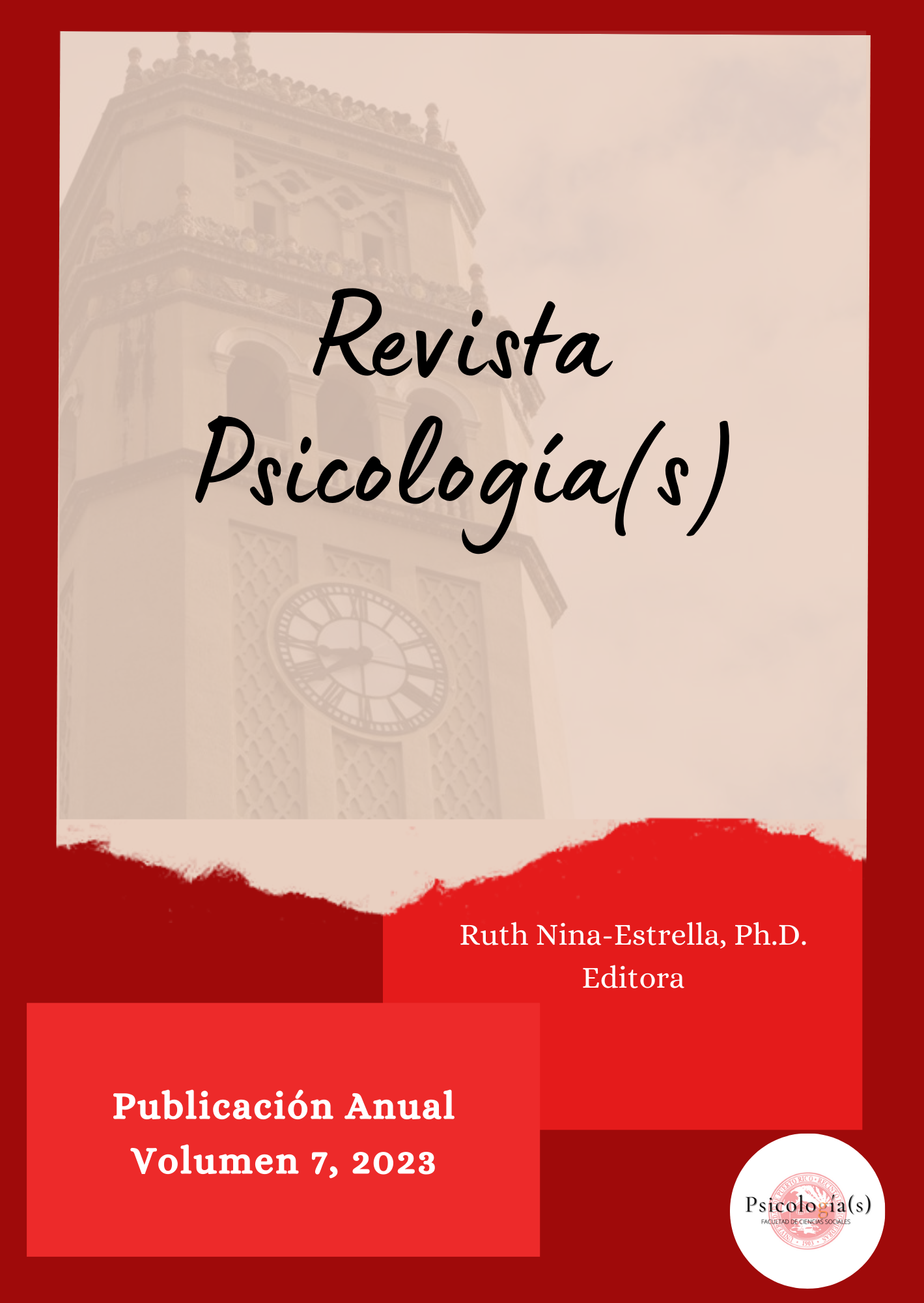Resumen
El aburrimiento académico es un fenómeno psicosocial que afecta a las personas en el contexto académico y es pertinente la existencia de instrumentos para medirlo en el contexto hispanoparlante. El propósito de este estudio fue desarrollar una escala para medir el aburrimiento académico. La muestra constó de 1,151 estudiantes universitarios en Puerto Rico entre las edades de 21 a 57 años (60% femenino y 40% masculino). Se desarrolló la Escala de Aburrimiento Académico adaptada de una Escala de Aburrimiento Laboral. Los resultados demostraron que la escala cuenta con excelentes propiedades psicométricas. Se concluye que el tener una escala reducida que mida adecuadamente la experiencia del aburrimiento académica permitirá expandir el desarrollo de investigaciones sobre este fenómeno en contextos académicos hispanoparlantes que podrían contribuir en el mejoramiento de la experiencia académica en los estudiantes.
Citas
Acee, T. W., Kim, H., Kim, H. J., Kim, J., Chu, H. R., Kim, M., Cho, Y., Wicker, F. W., & The Boredom Research Group. (2010). Academic boredom in under-and over-challenging situations. Contemporary Educational Psychology, 35, 17-27. https://doi.org/10.1016/j.cedpsych.2009.08.002
De la Fuente, J., Verónica-Paoloni, P., Vera-Martínez, M. M., & Garzón-Umerenkova, A. (2020). Effect of levels of self-regulation and situational stress on achievement emotions in undergraduate students: Class, study and testing. International Journal of Environmental Research and Public Health, 17(12), 4293. https://doi.org/10.3390/ijerph17124293
Doornik, J. A., & Hansen, H. (2008). An omnibus test for univariate and multivariate normality. Oxford Bulletin of Economics and Statistics, 70, 927-939. https://doi.org/10.1111/j.1468-0084.2008.00537.x
Farmer, R., & Sundberg, N. (1986). Boredom proneness: The development and correlates of a new scale. Journal of Social Issues, 59(1), 103-119. https://doi.org/10.1207/s15327752jpa5001_2
Ghensi, B. L., Skues, J. L., Sharp, J. L., & Wise, L. Z. (2021). Antecedents and effects of boredom among university students: An integrated conditional process model. Higher Education, 81(5), 1115-1132. https://doi.org/10.1007/s10734-020-00602-6
Goetz, T., & Hall, N. C. (2014). Academic boredom. In R. Pekrun & L. Linnenbrink-Garcia (Eds.), International handbook of emotions in education (pp. 311-330). Routledge/Taylor & Francis Group.
Khan, S., Sadia, R., Zahid Hayat, S., & Tahir, S. (2019). Relationship between academic boredom, learning climate and academic motivation among university students. Pakistan Journal of Psychological Research, 34(3), 621-638. https://doi.org/10.33824/PJPR.2019.34.3.34
Krannich, M., Goetz, T., Lipnevich, A. A., Bieg, M., Roos, A. L., Becker, E. S., & Morger, V. (2019). Being over- or underchallenged in class: Effects on students’ career aspirations via academic self-concept and boredom. Learning and Individual Differences, 69, 206-218. https://doi.org/10.1016/j.lindif.2018.10.004
Martínez-Lugo, M. & Rodríguez-Montalbán, R. (2016). Cuando el trabajo aburre: Análisis de las propiedades psicométricas de la Escala de Aburrimiento Laboral (EAL). Revista Interamericana de Psicología Ocupacional, 35(1), 7-20. https://doi.org/10.21772/ripo.v35n1a01
Mikulas, W. L., & Vodanovich, S. J. (1993). The essence of boredom. The Psychological Record, 43(1), 3-12.
Mugon, J., Boylan, J., & Danckert, J. (2020). Boredom proneness and self-control as unique risk factors in achievement settings. International Journal of Environmental Research and Public Health, 17(23), 9116. https://doi.org/10.3390/ijerph17239116
Nett, U. E., Goetz, T., & Daniels, L. M. (2010). What to do when feeling bored? Learning and Individual Differences, 20(6), 626-638. https://doi.org/10.1016/j.lindif.2010.09.004
Pekrun, R. (2006). The control-value theory of achievement emotions: Assumptions, corollaries, and implications for educational research and practice. Educational Psychology Review, 18(4), 315-341. https://doi.org/10.1007/s10648-006-9029-9
Pekrun, R., Goetz, T., Daniels, L. M., Stupnisky, R. H., & Perry, R. P. (2010). Boredom in achievement settings: Exploring control–value antecedents and performance outcomes of a neglected emotion. Journal of Educational Psychology, 102(3), 531-549. https://doi.org/10.1037/a0019243
Pekrun, R., Goetz, T., Titz, W., & Perry, R. P. (2002). Academic emotions in students' self-regulated learning and achievement: A program of qualitative and quantitative research. Educational psychologist, 37(2), 91-106. https://doi.org/10.1207/S15326985EP3702_4
Satorra, A., & Bentler, P. M. (2001). A scaled difference chi-square test statistics for moment structure analysis. Psychometrika, 66(4), 507-514. https://doi.org/10.1007/BF02296192
Sharp, J., Hemmings, B., Kay, R., Murphy, B., & Elliott, S. (2017). Academic boredom among students in higher education: A mixed-methods exploration of characteristics, contributors and consequences. Journal of Further and Higher Education, 41(5), 657-677. https://doi.org/10.1080/0309877X.2016.1159292
Skues, J., Williams, B., Oldmeadow, J., & Wise, L. (2016). The effects of boredom, loneliness, and distress tolerance on problem internet use among university students. International Journal of Mental Health and Addiction, 14(2), 167-180. https://doi.org/10.1007/s11469-015-9568-8
Solhi, M. (2021). University students’ multidimensional state boredom and strategies to cope with classroom boredom. Journal of Language and Education, 7(2), 204-222. https://doi.org/10.17323/jle.2021.12256
Tam, K., Poon, C., Hui, V., Wong, C., Kwong, V., Yuen, G., & Chan, C. (2020). Boredom begets boredom: An experience sampling study on the impact of teacher boredom on student boredom and motivation. British Journal of Educational Psychology, 90(S1), 124-137. https://doi.org/10.1111/bjep.12309
Tam, K. Y. Y., van Tilburg, W. A. P., & Chan, C. S. (2021). What is boredom proneness? A comparison of three characterizations. Journal of Personality, 89(4), 831-846. https://doi.org/https://doi.org/10.1111/jopy.12618
Torales, J., & Barrios, I. (2021). El aburrimiento en estudiantes universitarios. Revista de la Fundación Educación Médica, 20(4). https://dx.doi.org/10.33588/fem.204.900
Vîrgă, D., Pattusamy, M., & Kumar, D. P. (2020). How psychological capital is related to academic performance, burnout, and boredom? The mediating role of study engagement. Current Psychology, 41(10), 6731-6743. https://doi.org/10.1007/s12144-020-01162-9
Vogel-Walcutt, J. J., Fiorella, L., Carper, T., & Schatz, S. (2012). The definition, assessment, and mitigation of state boredom within educational settings: A comprehensive review. Educational Psychology Review, 24(1), 89-111. https://doi.org/10.1007/s10648-011-9182-7

Esta obra está bajo una licencia internacional Creative Commons Atribución-NoComercial-SinDerivadas 4.0.
Derechos de autor 2024 Psicologías

